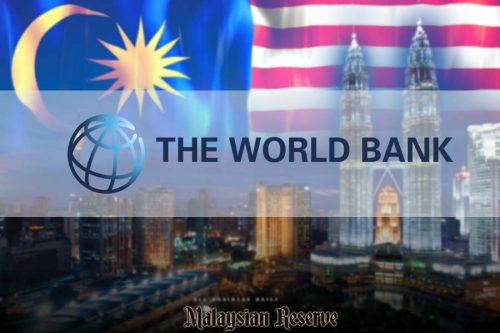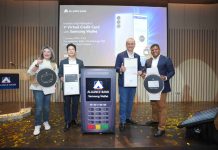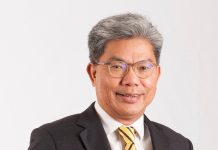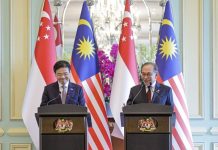- Malaysia Will Continue to Deliver Robust Growth: World Bank
- KWAP is First Pension Fund in Malaysia to be a Signatory of the UN-Supported Principles for Responsible Investment
- KWAP Targets 70 Pct Of AUM To Be ESG-compliant
- Rewardz, Malaysia to launch corporate weight loss challenge
- AirAsia launches Airport Facial Recognition System
- Rescuers Search for Missing People after Taiwan Quake that Killed at Least Four
- Global Smart City Network to Study Singapore’s Wireless@SG

Malaysia Will Continue to Deliver Robust Growth: World Bank
The World Bank said Malaysia will continue to deliver robust growth, well-backed by its diversified economy, a wide range of reform initiatives and strong macroeconomic policy frameworks to withstand external shocks. Its Development Prospects Group Director, M. Ayhan Kose, said the Malaysian economy has been doing well and the real growth rate for 2017 would likely be better than 2016’s. “Over the longer term perspective, Malaysia has undertaken a wide range of reforms and these had created the type of benefits that you can expect in an economy. “The economy is much more diversified today than it was 20 years ago, with institutions stronger and so are the macroeconomic policy frameworks. So, the potential growth is still at higher respectable level,” he told reporters in Kuala Lumpur. Last month, the World Bank, in its Global Economic Prospects report, said Malaysia’s gross domestic product growth was expected to grow at 5.2 per cent this year.
KWAP is First Pension Fund in Malaysia to be a Signatory of the UN-Supported Principles for Responsible Investment
Kumpulan Wang Persaraan (KWAP), Malaysia’s second-biggest pension fund today became the first pension fund in Malaysia to be a signatory of the United Nations-supported Principles for Responsible Investment (PRI). With the signing of the PRI, KWAP formally joins the PRI’s independently operated, global network of policymakers that is working to build a sustainable and economically effective financial system on the foundation of responsible investment for long-term value creation. As a PRI signatory, KWAP will remain committed to support and promote the use of environmental, social, and governance (ESG) investing programmes, incorporating measures to provide full transparency for investors, such as publicly reporting on investment activities in accordance with the PRI’s six core principles.
KWAP Targets 70 per cent of AUM To Be ESG-compliant
Meanwhile KWAP’s Chief Executive Officer, Datuk Wan Kamaruaman Wan Ahmad said the Retirement Fund is targeting fo 70 per cent of its assets under management (AUM) to be environmental, social and governance (ESG) standard-compliant. He said currently, the retirement fund’s AUM ESG standard compliance stood at between 50-60 per cent. He did not disclose the timeline for the target, but said the liquidity depended on the ecosystem that needed to be developed and matured, especially in secondary trading of financial instruments.
Rewardz, Malaysia to launch corporate weight loss challenge
Organizations in Kuala Lumpur and surrounding areas will soon be able to participate in the NewMe challenge, a one-of-a-kind corporate weight loss challenge provided by Rewardz, Malaysia. Interested companies need to sign up with Rewardz, and they will be provided with digital weighing scales, which automatically updates weight tracking data into the Flabuless App provided by Rewardz. The app provides a weight tracking dashboard, performance tracking and a leaderboard to encourage competition among individuals and across teams. The app allows for an unlimited number of user profiles or synchronizations for large-scale participation in the challenge. Starting in late 2017, the company did a pilot launch for Carrier UTC, in Malaysia which has been very successful. The overall results showed high employee participation rates of more than 90% and a reported loss of over 70 kilograms among participants within the first 6 weeks of the challenge.
AirAsia launches Airport Facial Recognition System
AirAsia has unveiled its Fast Airport Clearance Experience System (FACES), Malaysia’s first airport facial recognition system with self-boarding gate, at Senai International Airport, Johor Bahru, making it the first airline in Asia to have a seamless travel experience from check-in to boarding with the latest biometric facial recognition technology. FACES uses facial recognition technology to identify enrolled guests as they approach the automated boarding gate, allowing them to board their flight without having to present any travel documents. Guests who wish to be part of FACES may do so using a dedicated enrolment kiosk located at check-in kiosk area at Senai International Airport. Guests simply have to place their MyKad or chip-enabled passport in the document reader and look at the camera to create their biometric token. Available for guests aged 18 and above, the enrolment is a one-time process, after which guests may use AirAsia’s biometric gates for all flights as long as their identity document remains valid.
Rescuers Search for Missing People after Taiwan Quake that Killed at Least Four
Rescuers are still searching for 85 people reported missing following a strong earthquake killed at least four near the Taiwanese tourist city of Hualien overnight. The magnitude 6.4 quake hit near the coastal city just before midnight on Tuesday. Officials said 243 people were injured. The latest figures from government data indicated 85 people were missing. Local media reports cited Taiwan’s Ministry of Foreign Affairs as saying that the 31 foreigners affected. The government said aftershocks with a magnitude of at least 5.0 could rock the island in the next two weeks.
Global Smart City Network to Study Singapore’s Wireless@SG
Singapore’s Wireless@SG programme has catalysed the island nation through a free, seamless, secure and federated public Wi-Fi model. Its self sustaining ecosystem will now be studied at the Global City Teams Challenge 2018 (GCTC) for possible learnings and adoption. The GCTC is organized by the US Department of Commerce’s National Institute of Standards and Technology (NIST). The Info-communications Media Development Authority of Singapore (IMDA) will be leading a delegation to the GCTC to participate, engage in, and explore new partnership opportunities for government, industries, academia, TACs and NGOs.
























